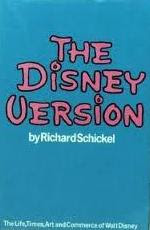 p. 18
p. 18"In essence, Disney's machine was designed to shatter the two most valuable things about childhood―its secrets and its silences―thus forcing everyone to share the same formative dreams. It has placed a Mickey Mouse hat on every little developing personality in America. As capitalism, it is a work of genius; as culture, it is mostly a horror."
p. 24
"[Disney] regarded urban design as the next great frontier of technology, and he wanted to be in on it."
p. 33
"Disney was continually, if mildly, irked because he could not draw Mickey or Donald or Pluto. He never could...Even more embarrassingly, he could not accurately duplicate the familiar 'Walt Disney' signature that appeared as a trademark on all his products. There are people who received authentically autographed Disney books and records but who thought they were fake because his hand did not match that of the trademark."
p. 136
"[Mickey's] humorlessness as well as his naïveté and his enthusiasm for projects were perhaps the first traits he inherited from Disney, who insisted that he had a sense of humor, put down those who lacked it, but was never the author of a genuinely funny remark that anyone ever recorded."
p. 139
"[Disney] was beginning to pay the price. 'I kept expecting more from my artists than they were giving me, and all I did all day long was pound, pound, pound,' he said later. 'Costs were going up. Somehow, each new picture we finished cost more to make than we figured it would earn; so I cracked up...I became irritable...and I couldn't sleep. I got the the point where I couldn't talk over the telephone because I'd begin to cry...'
"Finally, he consulted a doctor, who recommended a long trip."
pp. 140, 141
"There was always something obsessive about Walt Disney's personality. His single-minded concentration on his career, his possessiveness about his business, his unwillingness to share its management with any outsiders, his singular identification with The Mouse, the paternalism and the parsimony that marked his dealings with employees...In short, he carried the search for perfection to absurd lengths, and although he never again suffered a collapse like the one of 1931, he never learned to let up on his people either."
...
"He also acquired, at about this time, an obsession with death, which was so marked that even his daughter commented upon it in her study of her father."
p. 151
From "the last piece of writing ever to go out over Walt Disney's signature―the message to stockholders in the 1966 annual report of his company...: 'Back in the '30s The Three Little Pigs was an enormous hit, and the cry went up―"Give us more pigs!" I could not see how we could possibly top pigs with pigs. But we tried, and I doubt whether anyone of you reading this can name the other cartoons in which the pigs appeared.' It was a lesson well learned, and he refused to try to follow Snow White and the Seven Dwarfs with more films featuring the dwarfs, and as he said he said in this letter, he was not going to try to make sequels to Mary Poppins either. In an industry that has devoted enormous amounts of energy to scrambling on and off bandwagons it was an admirable and sensible policy."
p. 155
"The words [of Disney press releases] were designed to portray the organization as an open, happy, sunny institution, presided over first by a bashful boy artist, then (as he aged) an avuncular genius of the masses. Neither image could have been further from the truth about this complex man or his remarkable corporation...[Disney's discussions] revealed a man almost totally disengaged from the realities of the larger world even as that world was reaching out to him, fairly begging him to let it bestow its favors on him."
p. 354
"He told anyone who bothered to inquire that he was not a producer of children's entertainment, that in fact he had never made a film or a television show or an exhibit at Disneyland that did not have, as its primary criterion of success, its ability to please him. And he often admitted that his greatest pleasure was the business that he built, not the products it created. But he―and most especially his organization―did nothing to discourage the misunderstanding of his work and his motives. And so much did we want to believe that he was a kind of Pied Piper whose principal delight was speaking, for altruistic and sentimental reasons, the allegedly universal language of childhood, so much did we need an essentially false picture of him, that the public clung to this myth almost as tightly as an eager Wall Street hugged to its gray flannel bosom the delightful reports on the recent economic performance of Walt Disney Productions."













.jpg)
.jpg)
.jpg)

